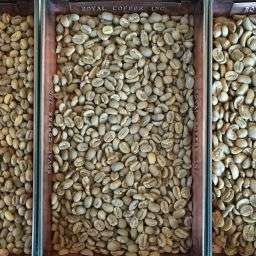
Purchasing coffee beans wholesale is a strategic approach for businesses and coffee enthusiasts alike, aiming to balance cost with quality. This method not only ensures a steady supply of coffee beans but also leverages economies of scale, leading to significant cost savings.
Furthermore, buying in bulk directly from roasters or suppliers guarantees that the coffee is fresh, preserving its nuanced flavors and aromas. This practice supports not just economic efficiency but also promotes a direct connection with suppliers, fostering a deeper understanding of coffee’s journey from bean to cup.
Benefits of Buying Wholesale
Cost Efficiency: Wholesale purchasing stands out for its cost-effectiveness. By ordering large quantities, buyers can negotiate better prices, reducing the per-unit cost substantially. This advantage is crucial for businesses looking to maintain a high-quality product while managing expenses.
Freshness: Freshness is paramount in coffee, directly influencing its flavor profile. Suppliers like Kaldi and Java Bean Plus emphasize the freshness of their beans, ensuring that wholesale buyers receive products that retain their optimal taste and aroma.
Variety: A significant benefit of wholesale buying is the access to a wide variety of beans. Suppliers often offer a range of origins, blends, and roasts, allowing buyers to cater to diverse consumer preferences. This variety is not just about geographical diversity but also includes different processing methods and flavor profiles, enabling a more tailored coffee experience.
Selecting the Right Wholesale Supplier
Quality of Beans: The cornerstone of selecting a supplier is the quality of the coffee beans. It’s essential to choose a supplier who sources high-quality, specialty beans that meet your standards. Black Ink Coffee Company and Driven Coffee are examples of suppliers committed to providing premium beans, focusing on the freshness and richness of their offerings.
Delivery Options: Reliable and timely delivery is crucial in maintaining a consistent supply. Suppliers should offer flexible delivery schedules and efficient logistics to ensure that your business never runs out of coffee.
Customer Service: Exceptional customer service is a hallmark of a reputable supplier. This includes not only responsive communication and support but also the ability to provide insights and recommendations tailored to your specific needs. Suppliers like Black Ink Coffee Company and Driven Coffee pride themselves on going beyond expectations to support their clients, indicating a partnership rather than just a transaction.
Types of Coffee Beans Available Wholesale
In the wholesale market, coffee beans can primarily be categorized into Arabica and Robusta, each offering distinct characteristics. Arabica beans are celebrated for their sweet, soft taste and higher acidity, often featuring hints of fruit and sugar, with overtones of berries or other fruits. Robusta, on the other hand, is known for its strong, harsher taste and a grain-like overtone, with a peanutty aftertaste. It contains more caffeine compared to Arabica.
Wholesalers also offer single-origin and blend coffees. Single-origin coffee is sourced from a single place, be it a country, region, or even a single farm, offering a unique taste characteristic of its origin’s soil, climate, and altitude. Blends, however, are a mix of beans from different origins, crafted to create a specific flavor profile.
Flavored coffees, another segment, involve adding flavoring oils to coffee beans after roasting, offering an array of tastes like vanilla, caramel, chocolate, or fruit, catering to diverse consumer palates. Suppliers like Java Bean Plus and Poverty Bay Coffee Company provide a wide selection of these coffee types, ensuring a comprehensive assortment for wholesale buyers.
Roasting and Flavor Profiles
Roasting plays a pivotal role in defining a coffee’s flavor profile. The process transforms the green coffee beans into the aromatic brown beans we’re familiar with. Roast levels range from light to dark; light roasts have a milder flavor, medium roasts are sweeter and balanced, and dark roasts offer a bold, richer taste with noticeable bitterness.
The flavor profile of coffee, deeply influenced by its roast level, can include a range of notes such as citrus, chocolate, nut, or spice. Light roasts typically retain the original flavors of the bean, influenced by its origin. Medium roasts start to exhibit a more balanced flavor and acidity, while dark roasts showcase deeper, bolder flavors, often with a smoky or chocolatey note.
Poverty Bay Coffee Company, for instance, emphasizes the importance of roasting to perfection to enhance the coffee’s inherent qualities.
Storage and Shelf Life of Wholesale Coffee Beans
For maintaining the freshness and flavor of wholesale coffee beans, proper storage is key. It is recommended to store coffee beans in an airtight container at room temperature, away from direct sunlight, moisture, and heat. This helps in preserving their freshness for longer periods. Wholesale suppliers like Kaldi suggest that green (unroasted) beans have a longer shelf life compared to roasted beans, which should be consumed within weeks of roasting for optimal freshness.
Equipment and Accessories for Wholesale Buyers
For wholesale buyers, having the right equipment is essential for ensuring the quality of coffee served. Essential equipment includes grinders, which are crucial for achieving the right grind size for various brewing methods. Brewing machines, tailored to different scales of operation, from single-cup brewers to large batch brewers, are also vital.
Additionally, storage solutions for both green and roasted beans are important to maintain freshness. Suppliers like Kaldi and Driven Coffee offer a range of commercial-grade equipment, ensuring that businesses can cater to high-quality coffee preparation and serving needs. From state-of-the-art espresso machines to precision grinders, having the right tools significantly impacts the final coffee quality offered to consumers.
Sustainability and Ethical Sourcing in Wholesale Coffee
The commitment to sustainability and ethical sourcing in the coffee industry has never been more critical. Fair trade, organic certification, and direct trade practices are vital components of this commitment, ensuring that coffee production supports not only environmental sustainability but also equitable transactions between buyers and coffee farmers.
Fair trade certification guarantees that farmers receive a fair price for their coffee, contributing to community development and economic stability. Organic certification, on the other hand, ensures that coffee is grown without harmful pesticides or chemicals, promoting ecological balance and protecting workers’ health.
Direct trade practices further emphasize the direct engagement between coffee roasters and farmers, often surpassing the minimum price standards of fair trade by investing in the quality and sustainability of coffee production. Poverty Bay Coffee Company and Cafe Campesino are examples of entities that prioritize these practices, showcasing a commitment to not only the quality of their coffee but also to the well-being of the environment and the livelihoods of the coffee-growing communities.
FAQs About Buying Coffee Beans Wholesale
How to Source Coffee Beans Wholesale: Sourcing wholesale coffee beans requires research and a clear understanding of your coffee quality expectations and business needs. Establishing relationships with reputable suppliers who align with your values, such as those offering fair trade or organic products, is essential.
Poverty Bay Coffee Company suggests considering suppliers that provide a range of options, from single-origin to blends, and offer transparency in their sourcing practices.
Roasted vs. Green Beans: The choice between roasted and green beans depends on your capacity to roast beans in-house. Buying green beans offers more control over the roast profile and freshness but requires roasting equipment and expertise. Roasted beans, while more convenient, have a shorter shelf life but allow for immediate use without additional processing.
Final Thoughts
The world of wholesale coffee beans is rich and complex, offering a diverse range of options for businesses and enthusiasts alike. From understanding the types of beans available to the importance of ethical sourcing and sustainability, making informed purchasing decisions is crucial.
The quality of the beans, the roast, and the supplier’s commitment to sustainability directly affect the final cup’s quality. By prioritizing these elements, businesses can ensure they offer not only a superior product but also support ethical and sustainable coffee production practices.









